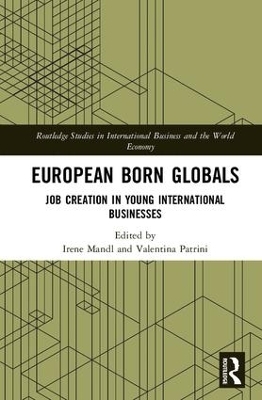
European Born Globals
Routledge (Verlag)
978-1-138-71395-6 (ISBN)
One of the business types identified as major engines of job creation are ‘born globals’ characterised as firms which engage intensively in internationalisation activities shortly after start-up. They are high on the entrepreneurship research agenda but so far little attention has been devoted to their potential as job creators, the processes they apply when hiring and the barriers they face.
Through a combination of secondary data analysis, literature reviews and international case studies, European Born Globals sheds new light on the motivations and processes of job creation in born global firms. It will contribute to understanding the ‘why’ and ‘how’ of job creation in born globals, essential not only for policy makers, but also for academic research and management education.
Irene Mandl is Head of Unit ‘Employment’ at Eurofound and has been working in policy-oriented research on employment and labour market as well as entrepreneurship for more than 15 years. Some of her major research topics refer to SMEs, internationalisation, specific forms of entrepreneurship or new forms of employment. Valentina Patrini is a researcher at Eurofound. Valentina is mainly focusing on entrepreneurship, internationalisation and innovation and their relationship with employment and job creation. She has ten years of experience in the field of socioeconomic research, including policy evaluations and comparative studies at European level.
Introduction
SMEs and job creation in Europe
Introduction
Economic and labour market contribution of European SMEs
Determinants of job creation in SMEs
Overview
Company external determinants
Company internal determinants
Concluding remarks: The profile of the job creating SME
Born globals’ job creation dynamism – the European perspective
Introduction
The business model of born globals
Economic and labour market contribution of born globals in Europe
Drivers and constraints for job creation
Processes and characteristics of job creation
Job creation in Swedish born globals
Introduction
Sweden’s economy and international trade
Born Globals in Sweden
Number of employees in born global enterprises
Willingness and expectation to grow
Examples of Swedish born globals
Axelent
Camp Scandinavia
Creative industries sector
Discussion
Managerial and policy implications
Employment and job creation in born global enterprises in Austria
Introduction
Mapping and characterising born globals in Austria
The number and share of born globals
Prevalence of born globals by sector
Size and workforce of born globals
Innovation activity of born globals
Owners and managers of born globals
Growth performance of born globals
Strategic orientation of born globals
Types of jobs created and personnel needed by born globals
Recruitment practices used
Barriers to job creation and recruiting
Support for recruitment and job creation
Key results and policy pointers
Annex: Further information on company case studies
Estonian born globals’ job creation
Introduction
Literature review
The literature on job creation
The literature on born globals
The literature on born globals as potential job creators
Data and method
Results
Conclusion and implications
Born globals and the Medical Technology cluster in the West of Ireland
Introduction
Literature review
Cluster theory
Born globals and industry clusters
The cluster life cycle
Irish medical technology industry
The Medical Technology Cluster in the west of Ireland
Indigenous entrepreneurship in the cluster
Discussion
Conclusions
More than job creation. Employee engagement in knowledge sharing and learning advantages of newness
Introduction
Learning advantages of newness
Employee engagement in knowledge sharing
Selective recruitment
Training
Primary evidence from six Spanish case studies
Sample
Description of the jobs created
Employees’ engagement in knowledge sharing
Recruitment and employee engagement in knowledge sharing
Training and employee engagement in knowledge sharing
Conclusions: uncovering the role of human resource practices in promoting born globals’ learning advantages of newness
Conclusions and policy pointers
Why focusing on job creation in born globals?
Development pathways of born globals
Specific public support for job creation in born globals
For future policy debate: Job creation by born globals
| Erscheinungsdatum | 22.12.2017 |
|---|---|
| Reihe/Serie | Routledge Studies in International Business and the World Economy |
| Zusatzinfo | 18 Tables, black and white; 22 Line drawings, black and white; 22 Illustrations, black and white |
| Verlagsort | London |
| Sprache | englisch |
| Maße | 156 x 234 mm |
| Gewicht | 453 g |
| Themenwelt | Mathematik / Informatik ► Mathematik ► Finanz- / Wirtschaftsmathematik |
| Wirtschaft ► Betriebswirtschaft / Management ► Planung / Organisation | |
| Wirtschaft ► Betriebswirtschaft / Management ► Unternehmensführung / Management | |
| Wirtschaft ► Volkswirtschaftslehre ► Makroökonomie | |
| ISBN-10 | 1-138-71395-3 / 1138713953 |
| ISBN-13 | 978-1-138-71395-6 / 9781138713956 |
| Zustand | Neuware |
| Haben Sie eine Frage zum Produkt? |
aus dem Bereich


